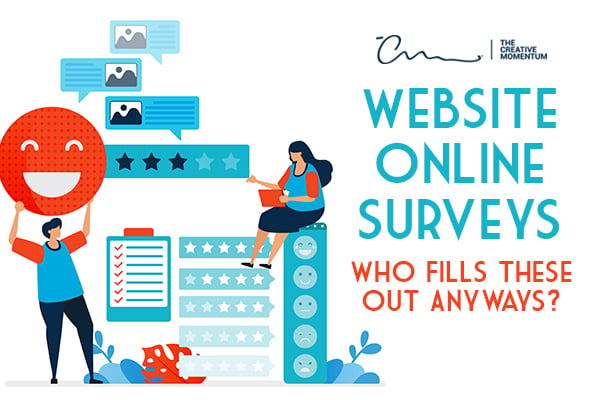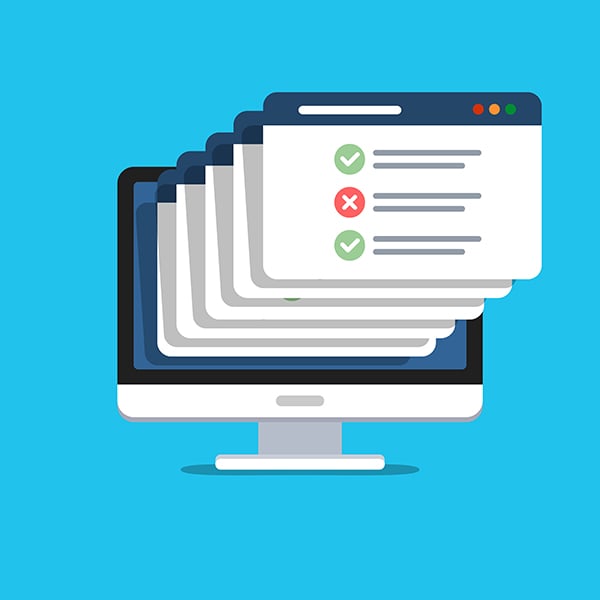
We’ve all been asked to take them—those online surveys from a company website. They can pop up after we just purchased a pair of sneakers, applied for a credit card, or live chatted with a customer service representative about fixing our vacuum. Just when you’re finishing a transaction, there it is on your screen.
“We value your feedback. Would you be willing to participate in a brief survey to help us serve you better?"
Do you take it? And how useful is it to the company asking the questions? According to the Journal of Computer-Mediated Communication, companies that use surveys gain access to unique populations, save time, and save money:
“The technology for online survey research is young and evolving. Until recently, creating and conducting an online survey was a time-consuming task that required familiarity with web authoring programs, HTML code, and scripting programs. Today, survey authoring software packages and online survey services make online survey research much easier and faster.”
Wealth of competition in the survey services industry
Do a simple Google search using the words “website surveys” and you’ll get three or four pages of links to companies that provide a survey service. Some allow you to sign up for the service and create the surveys yourself. But again, the question is: Are these surveys really helping the company or just annoying consumers?
Helpful or annoying?Let's look at it from both sides.

First, the customer.
We all have to admit that we’ve been annoyed when one of these surveys pops up. We’re busy, we don’t want to waste the time, we wonder if it even makes a difference, etc. But then there are the times we actually want to share our thoughts. These surveys offer customers a way to do that from “behind a keyboard.” This is a safe place to unload our thoughts, and it’s easier than writing a testimonial. For a positive testimonial, a customer has to figure out what to say, and nine times out of ten, he or she won’t do it.
But what if a customer isn’t happy with the product or service? Same thing. The survey provides an opportunity to speak one’s mind without actually saying it to someone. Bottom line? To the consumer, the website survey can actually be a welcome tool.
Now the company.
Again, if you do a Google search, you’ll find a lot of folks saying that the website survey is one of the most effective methods of collecting feedback from customers. That feedback is vital for helping companies improve what they offer, how they offer it, and how they react when those customers aren’t happy. And leveraging automation is one of the best company practices of 2021. By creating a survey to automatically ask questions of customers, you really can improve business.
What’s in a question?
Pretty much everything. We know that an automatic survey can bring in much valuable, honest feedback, and we know that surveys can save time and money. But, how do you figure out what to ask? The most important thing is to gather information about things you don’t already know. But first, let’s look at the types of questions to ask.
Types of survey questions

There are several types of questions you can ask. They make a difference, and they can be used at specific times.
- Open-ended questions
- Closed-ended questions
- Nominal questions
- Likert scale questions
- Rating scale (or ordinal) questions
- Yes or no questions
Let's break these down.
Open-ended questions
The open-ended question helps you learn about customers’ needs, some you didn’t know about. They’re great for companies just starting to create surveys because they help generate future questions. However, you do need to be careful. As we mentioned above, some folks don’t like to figure out what to write, and if you use too many of these, customers may get bored and give up. These types of questions are also harder to analyze.
Closed-ended questions
A closed-ended question gives customers options, such as a list to choose from. Obviously a closed-ended question is easier to analyze and easy for the customer to complete. These are also good questions with which to begin a survey. The following four types of questions come under this category.
Nominal questions
These questions offer the customer choices. An example of this is:
“What type of animal do you own? a. Dog, b. Cat, c. Horse, d. Ferret.” These are best if there’s a limited number of answers. But be careful. If you were to use the example above, you’d be missing out on information from the people who own turtles, birds, snakes, etc. So, you might want to also add “e. Other.”
Likert scale questions
These are those “strongly disagree” to “strongly agree” or “very dissatisfied” to “very satisfied” questions. These are great when you already know there may be an issue with something in your business, and you’re trying to validate that and see what customers are thinking.
Rating questions
Rating questions are a great way to figure out if you’re moving in the right direction. Example: “On a scale of 1 to 10, how likely are you to purchase this product again?” When you analyze the answers, you’ll see a trend.
Yes or no questions
And finally “yes” or “no” questions. These are also great to start a survey with because they’re usually easy to answer. You can even use these questions to divide your customers. For example, if you want to isolate the customers who said “yes” to purchasing a particular service, you can separate them out and survey them again in the future, or you can prepare a specific marketing campaign just for them.
Website surveys are useful tools
While most visitors will not fill out website surveys when presented with the opportunity, a small few will. The bottom line is that these surveys are an accessible way for visitors to send a company feedback that they may not have taken the time to send otherwise. Receiving prospect and customer feedback is gold for businesses: it's the best way to understand what's working for your business, what isn't, and make plans for how to improve.


